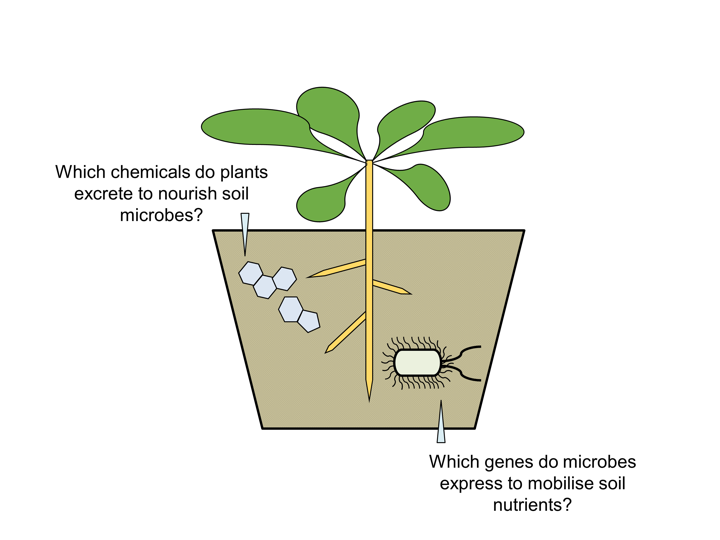The importance of soil health and how microbes can contribute to improved farming systems
Healthy soils are vital for crop yields, and there is historical evidence that declines in soil fertility have contributed to the collapse of entire societies. Many aspects of contemporary farming, such as monocultures, ploughing and fertilisation, can provide short-term yield increases, but actually threaten long-term farm productivity because they negatively impact soil health.
Soils are diverse ecosystems, where plant roots interact with microorganims such as bacteria, fungi and amoeba, and also vertebrate and invertebrate animals. In natural ecosystems, these belowground organisms are responsible for maintaining soil health by recycling nutrients and shaping soil structure. However, in most contemporary agricultural systems, we have substituted these ecological processes with synthetic inputs: for example pesticides that replace natural mechanisms of disease suppression, or fertilisers that replace natural processes of nutrient recycling.
Although soil is seemingly everywhere on land, the thin layer of fertile topsoil that can actually support plant growth is being lost at a rapid rate. This is mainly because unsustainable farming practices are removing topsoil viacausing processes such as erosion (loss of soil quantity) and degradation (loss of soil quality) and nutrient depletion. These processes of soil loss are occurring at a rate that greatly exceeds the natural process of soil formation (approximately by a factor of 50). Calculations estimate that if we persist with current farming practices, then most of the world’s topsoil will be lost in around 60 years. So, what can we do differently to conserve this valuable resource?

A comprehensive strategy for soil conservation would involve a wide variety of approaches – political, social, economic and technical. Perhaps the most important initiatives would involve financially rewarding farmers who are responsible custodians of their soil, rather than the current system that rewards the short-term pursuit of crop yields regardless of the environmental cost. But, science can also contribute to promoting soil health, by researching possibilities for more sustainable farming systems.
Our work at CEPLAS involves characterising the nutrient transfers undertaken by bacterial strains associated with the plant root. The goal is to design more sustainable cropping systems, where mineral fertilisers are replaced by organic inputs, and plants access these nutrients via co-operative associations with soil microbes. The logic of this idea is that organic inputs can be obtained more sustainably than mineral fertilisers, by composting various waste products that society is currently throwing away. Furthermore, adding organic material to soil can solidify its structure, therefore reducing rates of erosion.
Organic farms are already using fertilisation strategies that have the potential to better sustain soil health, but most scientific research has focussed on conventional farms, so many aspects of organic farms are poorly studied. For instance, which particular growth-promoting microbes are particularly adept at transferring nutrients from the soil to the plant? Can we breed plant varieties that are best able to co-operate with growth-promoting microbes? How can compost be formulated and applied to boost plant growth, maintain soil health, and minimise nutrient loss? Potentially, this knowledge could inform both organic and conventional farmers about how they could use microbes to nourish their plants and sustain their soils.
At CEPLAS our work studies the molecular events that occur when microbes metabolise soil-bound nutrients, and also the molecular strategies used by plants to recruit and nourish these growth-promoting microbes. We aim to discover knowledge that will be used in future agricultural systems, which would have lower levels of mineral fertilisation and higher rates of microbial nutrient cycling. As well as maintaining soil health, such systems would also be good for the environment because mineral fertiliser production is resource-intensive and highly polluting, while fertiliser run-off damages aquatic ecosystems.
Contemporary agricultural practices are damaging the world’s soils, and it will require multidisciplinary approaches to modify our agricultural systems to ensure we preserve healthy soils for future generations. At CEPLAS we are researching how plants and microbes co-operate to transfer nutrients, and this knowledge could potentially be used to improve agricultural sustainability. However, we recognise that our science will not be the single solution to this challenging global problem. A comprehensive approach to manage soil health will involve combining scientific discoveries with social, economic and political changes that recognise the importance of soil, and also its vulnerability.
Dr. Richard Jacoby, Botanical Institute, University of Cologne
Planter’s Punch
Under the heading Planter’s Punch we present each month one special aspect of the CEPLAS research programme. All contributions are prepared by our young researchers.
Further Reading
"We’re treating soil like dirt. It’s a fatal mistake, as our lives depend on it" – The Guardian 2015 -
"Status of the World's Soil Resources" – United Nations Food and Agriculture Organisation -
"Soil and human security in the 21st century" – Amundson et al., Science, 2015 -
About the Author

The article was written by Dr. Richard Jacoby, who is a member of the CEPLAS Postdoc Programme. In his research project, Richard is analysing which plant-derived chemicals are consumed by soil microbes and how microbes can mobilise soil-bound nutrients which can improve plant nutrition. A deeper understanding of those processes would allow the design of more sustainable cropping systems, where mineral fertilisers are replaced by organic inputs, and plants access these nutrients via co-operative associations with soil microbes.